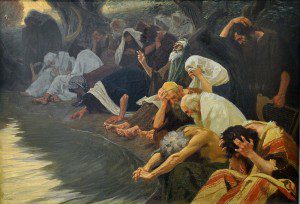
(“By the Waters of Babylon”)
Gebhard Fugel, ca. 1920
(Wikimedia CC public domain; click to enlarge)
By the rivers of Babylon, there we sat down, yea, we wept, when we remembered Zion.
We hanged our harps upon the willows in the midst thereof.
For there they that carried us away captive required of us a song; and they that wasted us required of us mirth, saying, Sing us one of the songs of Zion.
How shall we sing the Lord‘s song in a strange land?
If I forget thee, O Jerusalem, let my right hand forget her cunning.
If I do not remember thee, let my tongue cleave to the roof of my mouth; if I prefer not Jerusalem above my chief joy. (Psalm 137:1-6)
In today’s reading from the Book of Mormon, 2 Nephi 6, we hear for the first time from Jacob, one of Nephi’s younger brothers.
Yet he’s addressing topics and a text that Nephi has assigned to him (2 Nephi 6:4).
Plainly, he agrees with Nephi’s method of scriptural exegesis or interpretation because, just as his brother had, he speaks of “likening” the scriptures (and specifically Isaiah) to his own people. The underlying notion here seems to be that the history of Israel unfolds in recurring patterns or cycles — for Jacob expressly says that it is because the Nephites are of Israel that the principle of scriptural “likening” can work (2 Nephi 6:5). And this may be especially so with the prophet Isaiah, which is an important key to understanding that rich and seemingly difficult book.
Jacob has learned by revelation that Jerusalem has indeed fallen by this point, as Lehi had warned that it would (in the very first chapter of the Book of Mormon), and that what is commonly called the “Babylonian captivity” of the Jews has begun (2 Nephi 6:8). This indicates, if Jacob’s inspiration was accurate, that he’s speaking in or after 586 BC.
In 2 Nephi 6:12, Jacob announces that the Gentiles can be heirs of salvation — but only if they “do not unite themselves to that great and abominable church” (on which, among other passages, see 1 Nephi 13). Which suggests to me that that infamous “church” isn’t merely some specific denomination, a group of people who happen to have fallen into honest but unfortunate doctrinal error on one or more issues. It is, as other scattered comments about it throughout 1-2 Nephi strongly suggest (see, for example, my comment here), a collective designation for all those who disdainfully reject God, his self-revelation, and his commandments and who live lives focused instead on pleasure, power, and wealth in this world.











